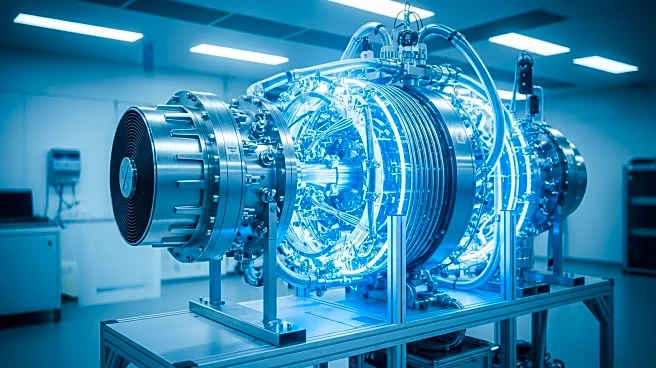What is the story about?
What's Happening?
HyFlux, a clean tech company, is partnering with the University of Sheffield Advanced Manufacturing Research Centre (AMRC) to develop a cryogenic cooling system for hydrogen-electric aircraft. The project, named SUPERCOOL, is a £1.5 million initiative aimed at enabling lightweight, high-efficiency cooling necessary for superconducting motor operation in zero-emission propulsion systems. HyFlux will lead the project delivery, system architecture, and commercial strategy, while AMRC will support engineering validation and integration. The Institute for Advanced Automotive Propulsion Systems (IAAPS) at the University of Bath will provide test infrastructure to qualify the cooling system's performance under realistic hydrogen conditions. The Aerospace Technology Institute (ATI) Programme is funding £1.1 million towards the project, with the remaining amount financed by HyFlux.
Why It's Important?
The collaboration between HyFlux and AMRC represents a significant advancement in sustainable aviation technology. By developing a cryogenic cooling system, the project addresses critical challenges in achieving zero-emission flight, such as maintaining optimal operating temperatures for superconducting motors. This initiative supports the broader roadmap to decarbonize aerospace and maritime transport through scalable hydrogen-electric systems. The project exemplifies how UK-led partnerships can translate scientific research into commercially viable solutions, potentially positioning the UK as a leader in sustainable aerospace innovation. The success of this project could accelerate the adoption of hydrogen-electric propulsion systems, contributing to global efforts to reduce carbon emissions in the aviation industry.
What's Next?
The SUPERCOOL project will focus on designing, manufacturing, and testing the cryogenic cooling system components, such as the heat exchanger, using computational fluid dynamics to ensure efficiency. The IAAPS will utilize its liquid hydrogen test facility for ground-based validation of the cooling system, which is crucial for de-risking the technology for future flight demonstrations. The project has garnered support from local and national stakeholders, including MP Sadik AI Hassan, who emphasizes the importance of investing in future fuels like hydrogen. The successful implementation of this technology could lead to further collaborations and advancements in zero-emission propulsion systems.
Beyond the Headlines
The development of the cryogenic cooling system for hydrogen-electric aircraft highlights the ethical and environmental dimensions of transitioning to sustainable aviation. By reducing reliance on fossil fuels, the project contributes to global efforts to combat climate change and promote cleaner energy solutions. The collaboration also underscores the importance of international partnerships in advancing technological innovation and addressing complex challenges in the aerospace industry. As the project progresses, it may inspire similar initiatives worldwide, fostering a culture of sustainability and innovation in aviation.















